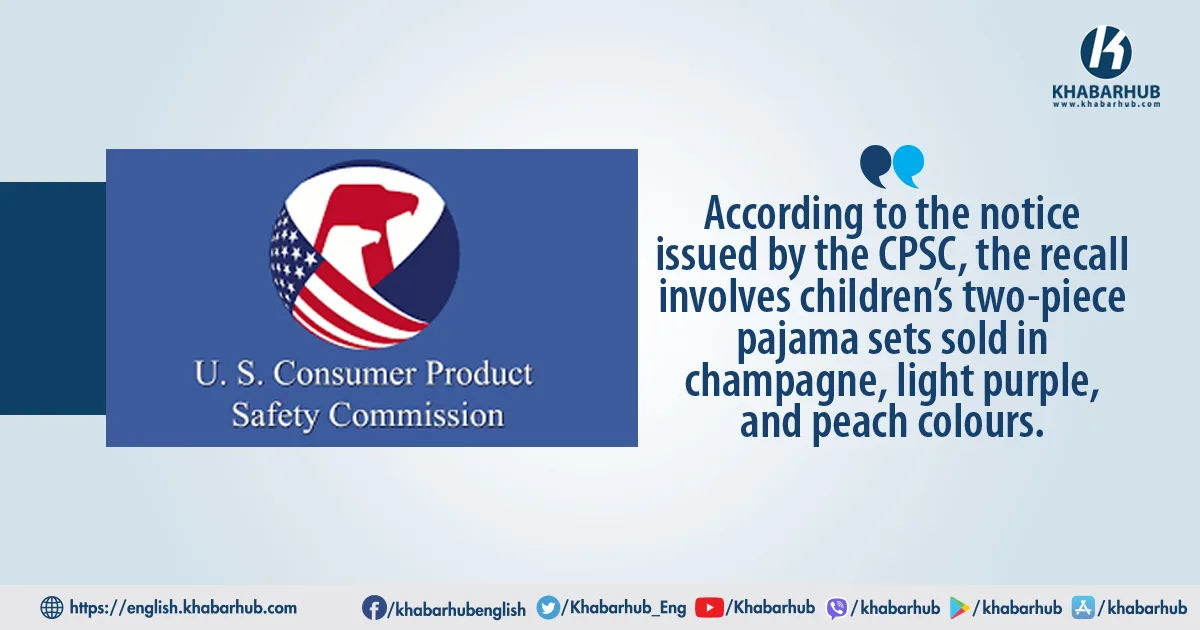A US federal agency last week announced the recall of more than 18,000 kidswear, including children’s sleepwear and pajama products, sold via the China-based marketplace Temu because they pose a “risk of burn injuries” in kids, reports said.
The United States Consumer Product Safety Commission (CPSC), in a bulletin, said that about 18,620 Juvenno Kids’ button-up short-sleeve pajama tops and shorts “violate the flammability standards for children’s sleepwear” and were “exclusively” sold via Temu, a China-based company recently flagged by the Arkansas attorney general over possible data theft concerns.
CPSC is a Maryland-headquartered independent agency of the US government that seeks to promote the safety of consumer products by addressing “unreasonable risks” of injury; developing uniform safety standards; and conducting research into product-related illness and injury.
According to the notice issued by the CPSC, the recall involves children’s two-piece pajama sets sold in champagne, light purple, and peach colours.
According to a report by the Epoch Times, the move by the US federal agency came after Arkansas Attorney General Jim Griffin filed a lawsuit against Temu last month, claiming the app is a “data theft business” that allegedly uses malware and spyware.
The pajama set consists of a short-sleeve, button-up top and matching shorts, and all colours have white trim on the sleeves, collar, shirt pocket, placket with buttons down the centre seam of the shirt, shirt hem, and shorts hem, as per the CPSC bulletin.
The Epoch Times reported, quoting the CPSC notice, that the recalled pajamas have a label that says 100 percent polyester and includes the size, washing instructions, and the text “MADE IN CHINA.”
The agency has also advised the consumers to “immediately take the recalled pajamas away from children”, and to “stop using them”.
Asking the consumers to contact Juvenno Kids to receive a full refund, the CPSC stated in the notice, “Consumers should destroy the garments by cutting the top and bottom in half and dispose of them in accordance with local and state recycling laws.”
However, no injuries have been reported in connection to the product, which was retailed by China’s Juvenno Kids and sold for approximately $9 exclusively online via Temu from October 2022 through May 2024.
Not only Juvenno Kids’ products, the US CPSC last week (July 11) also recalled more than 4,300 Made-in-China children’s nightgowns manufactured by Lovely Angel Children’s Lace Nightgowns as the products violate federal flammability standards for children’s sleepwear and similarly pose a risk of burn injuries.
According to the notice issued by the US federal agency, those recalled nightgowns — imported by Tong Tai Clothing Co. Ltd., dba Lovely Angel, of China — were also sold exclusively online via Temu from June 2023 to May 2024 for about $10.
Like the Juvveno Kids’ products, the agency has advised the consumers to take the nightgowns away from children and destroy the product before asking Lovely Angel’s online store for a refund.
Apart from this, the CPSC, on the same day, recalled about 45,300 units of another Temu-exclusive children’s pajama product, made by Fashion Online, over related burn hazard concerns.
The Made-in-China pajama sets are sold in eight separate styles and include text such as “I LOVE DAD,” “I LOVE MOM,” “TUTU AWAKE TO SLEEP,” and “LOL,” as well as images with unicorns and hearts, the CPSC notice read.
Last week, the federal agency also recalled two other childrens’ products which were not exclusively sold on Temu — Halloween witch hats sold by the Illinois-based Claire’s and Icing Stores and a set of Chinese made SWOMOG pajamas sold via Amazon.com.
The CPSC said the products were recalled because they pose a burn hazard risk, and the agency also advised consumers to destroy the items and ask the respective companies for a refund.
However, a Temu spokesperson, in response to the lawsuit and Jim Griffin’s claims, told The Epoch Times that the “allegations in the lawsuit are based on misinformation circulated online, primarily from a short-seller, and are totally unfounded.”
According to a report by the Epoch Times, the move by the US federal agency came after Arkansas Attorney General Jim Griffin filed a lawsuit against Temu last month, claiming the app is a “data theft business” that allegedly uses malware and spyware.
Referring to his lawsuit against Shanghai-based Temu, Attorney General Jim Griffin told Fox News last week, “Not just traditional consumer data, but using malware, spyware to have complete access to your information. And [taking it] one step further, their code is written in such a way to evade detection.”
However, a Temu spokesperson, in response to the lawsuit and Jim Griffin’s claims, told The Epoch Times that the “allegations in the lawsuit are based on misinformation circulated online, primarily from a short-seller, and are totally unfounded.”
“We categorically deny the allegations and will vigorously defend ourselves. We understand that as a new company with an innovative supply chain model, some may misunderstand us at first glance and not welcome us,” the spokesperson was quoted as saying by the Epoch Times.









Comment